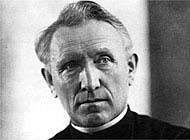Canton Fribourg pays tribute to its “musician-priest”

One of the best-known Swiss personalities of the 20th century, Father Joseph Bovet, is being remembered in Canton Fribourg this weekend with a series of concerts on the 50th anniversary of his death.
Abbé Bovet – as he is known to the Swiss – was a musician-priest whose compositions included religious music, operettas and popular songs, written in French, German, Latin and in the local dialect – or patois – of the region around Gruyère, where he was born in 1879.
One of his songs, “Le Vieux Chalet”, has been given almost national anthem status by many Swiss, and translations in several languages have also made it well-known outside Switzerland.
It was composed almost by accident. In 1910, Abbé Bovet was adding the finishing touches to the editing of a collection of his music when he received a telegram from his publisher. “We have a blank page available,” it said. “Send another song!”
Abbé Bovet chose as its subject the simplest he could find – a mountain chalet – and not only did it immediately rouse public interest locally, it is still on the repertoire of choirs throughout the world.
After his ordination, he combined his priestly duties with teaching music in and around Fribourg, and soon established a reputation as a charismatic figure. This reputation spread to other parts of Switzerland, and he achieved cult status during his lifetime – especially during World War II, when he was regarded as a national symbol.
“He was not a teacher but a master,” said Monsignor Bernard Genoud, Bishop of Fribourg, Lausanne and Geneva, in an interview with Swiss radio. “He did not have students, only disciples.”
Despite the veneration accorded him by his fellow-Swiss, Abbé Bovet spent the final years of his life in what’s been described as “a state of quarantine” imposed on him by the religious authorities in Canton Fribourg.
His bishop had written to castigate him for seeing too much of a female friend, and warning him against a potential scandal.
Abbé Bovet was devastated by the suspicions directed at him and went into voluntary exile near Lake Geneva, where he died in 1951.
by Richard Dawson

In compliance with the JTI standards
More: SWI swissinfo.ch certified by the Journalism Trust Initiative








You can find an overview of ongoing debates with our journalists here . Please join us!
If you want to start a conversation about a topic raised in this article or want to report factual errors, email us at english@swissinfo.ch.